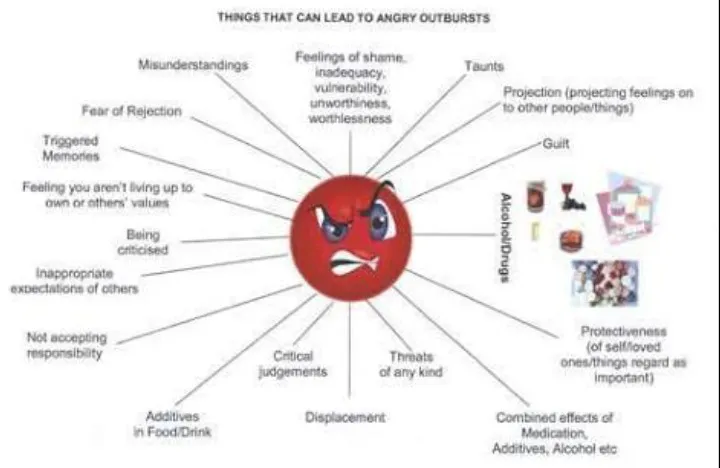What is Anger:-
Anger is a basic human emotion that is experienced by all people. Typically triggered" by an emotional hurt, anger is usually experienced as an unpleasant feeling that occurs when we think we have been injured, misguided, opposed 1n our longheld Views, or when We are faced with obstacles that keep us from attaining personal goals.

“For every minute you are angry you lose sixty seconds of happiness.”
The experience of anger varies widely; how often anger occurs, how intensely it is felt, and how long it lasts are different for each person. People also vary in how easily they get angry (their anger threshold), as well as how comfortable they are with feeling angry. Some people are very aware of their anger, while others fail to recognize anger when it occurs. Some experts suggest that the average adult gets angry about once a day and annoyed or peeved about three times a day. Other anger management experts suggest that getting angry fifteen times a day is more likely a realistic average. Regardless of how often we actually experience anger, it is a common and unavoidable emotion. When well managed, anger or annoyance has very few detrimental health or interpersonal consequences. At its roots, anger is a signal to you that something in your environment isn’t right. Out of control anger alienates friends, co-workers and family members. It also has a clear relationship with health problems and early mortality. Hostile,aggressive anger not only increases your risk for an early death, but also your risk for social isolation, which itself is a major risk factor for serious illness.
Anger Management : -

The goal of anger management is to reduce both your emotional feelings and the physiological outburst that anger causes. You can’t get rid of, or avoid, the things or the people that enrage you, nor can you change them, but you can learn to control your reactions.

CAUSES OF ANGER
“Anger is never without a reason, but seldom with a good one”
•Anger is a response to feelings of unhappiness, which in turn arise whenever we meet with unpleasant circumstances. Whenever we are prevented from fulfilling our wishes, or forced into a situation we dislike in short, whenever we have to put up ' with something we would rather avoid our uncontrolled mind reacts by immediately feeling unhappy. This uncomfortable feeling can easily turn into anger, and we become even more disturbed than before.
•The other main reason we become unhappy and angry is because we are faced with a situation we do not want or like. Every day we encounter hundreds of situations we do not like, from stubbing our toe or having a disagreement with our partner, to discovering that our house has burnt down or that we have cancer; and our normal reaction to all of these occurrenCes is to become unhappy and angry. However, try as we might, we cannot prevent unpleasant things happening to us. We cannot promise f that for the rest of the day nothing bad will happen to us; we cannot even promise‘ that we shall be alive to see the end of the day.
STYLES OF ANGER
Each of us deve10ps their own special style of anger:
1.A person may yell, curse, and offer gestures to other drivers when s/he is in a hurry and frustrated.
2.A person may shut down in a chair and stop speaking and looking at others.
3.A person may take her/his frustration out 'only on the ones s/he loves.
4.A person may disregard the object of his annoyance by reading the paper, forgetting to run an errand, or playing the radio too loudly. When s/he is confronted, the response is: I didn’t know; I forgot; I’m tired.
A person may blame everybody for everything and rarely accepts responsibility for his own short comings. “
A person may believe s/he has been given the right to seek vengeance in any way for anything by using the excuse: they deserved it.